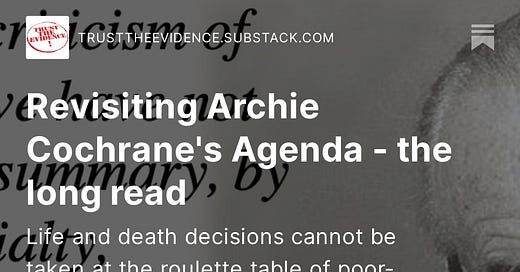Revisiting Archie Cochrane's Agenda - the long read
Life and death decisions cannot be taken at the roulette table of poor-quality evidence.
Archie Cochrane was an interesting character with a wealth of experience in difficult situations. He participated in the Spanish Civil War and was captured in Crete in 1941 when it fell to Hitler. Four years in a cage as a prisoner of war meant he had time to think, and he came up with some extraordinary ideas expressed in his book Effectiveness and Efficiency: Random Reflections on Health Services. Despite contemporary hype, it sold less than the 1,000 copies in its original print run.
Cochrane’s ideas were picked up and developed by a group of people who, at the time, were seen as “out there” but soon gave shape and substance to the Cochrane Collaboration. This organisation, which has gone through a spectacular rise, a period of stasis and is now in decline, describes Cochrane legacy as follows:
“Archie Cochrane is best known for his influential book, Effectiveness and Efficiency: Random Reflections on Health Services, published in 1972. The principles he set out in it so clearly w…
Keep reading with a 7-day free trial
Subscribe to Trust the Evidence to keep reading this post and get 7 days of free access to the full post archives.





